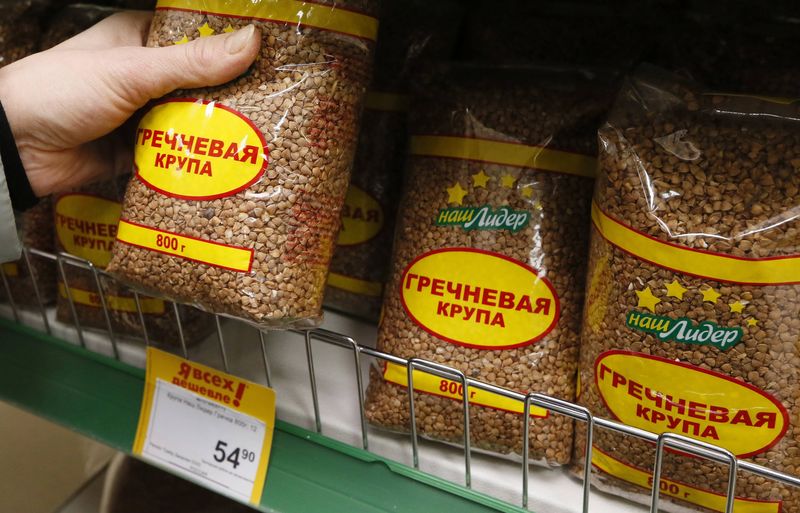By Timothy Heritage
MOSCOW (Reuters) - As if Russian President Vladimir Putin did not have enough to worry about with Western sanctions, falling oil prices and a collapsing currency, there is also now the price of buckwheat.
Rumours that snow has ruined the harvest in the Altai region that grows the fruit seed have caused panic-buying in some areas and pushed up the price of one of Russia's most popular foods.
Stockpiles are plentiful, experts see no reason for concern or shortages, and analysts rule out any link with the sanctions imposed over the Ukraine crisis.
But Putin still has a problem: any hint of panic over Russia's economic downturn could be exploited by critics at home and abroad as a sign that the sanctions are biting hard.
"It's pure and simple hysterics," the head of the ProZerno grain consultancy, Vladimir Petrichenko, said of the panic-buying. Appealing for calm over the snowfall, he said: "Everybody said everything had been lost, not just part of the crop."
Russians eat what they call "grechka" in traditional dishes as well as everyday meals such as "kasha" (porridge).
Prices doubled almost overnight after the snow this month in mountainous Altai, near China, Kazakhstan and Mongolia, but ProZerno has predicted a 2014 crop of 705,000 tonnes, more than enough to meet the annual demand of 550,000 tonnes.
The economic impact may ultimately be minimal, but the political damage may already have been done.
Footage shot by a hidden camera - and broadcast on state-run Channel One at the weekend - showed customers buying a grocery store out of buckwheat in minutes. In the frantic buying, one man was seen grabbing at least nine bags.
EMPTY SHELVES, PUBLIC MOOD
Such images evoke memories of the empty shelves of the Soviet communist era when Moscow was isolated - a situation Putin says will not be repeated over Ukraine.
Some commentators even see buckwheat as a barometer of the public mood.
"We are a country that has always been hungry throughout history," Yevgenia Albats, editor of the liberal New Times magazine, told Ekho Moskvy radio which is often critical of Putin. She described stocking up on buckwheat as "quite rational behaviour when the rouble is falling."
Opinion polls show Putin's popularity ratings are sky-high, backed by pliant media that have supported his efforts to show the Russian public is united over Ukraine and against sanctions.
In response to the panic-buying, media have increasingly got on message, accompanying most reports with comments by experts reassuring viewers there is not cause for concern.
State-run Channel One television blamed the situation on "speculators", a similar explanation to one provided for the rouble's slide and shifting any blame away from the Kremlin.

Underlining the importance of the buckwheat situation, the Federal Anti-Monopoly Service in the Altai even launched an investigation. It said on Monday it had found "no signs of collusion" to manipulate prices.
(Additional reporting by Polina Devitt; editing by Janet McBride)